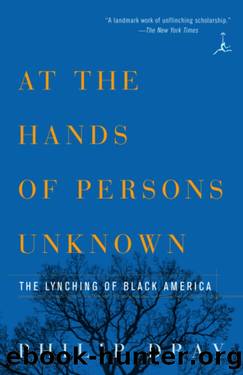At the Hands of Persons Unknown: The Lynching of Black America by Philip Dray

Author:Philip Dray [Dray, Philip]
Language: eng
Format: epub
Tags: History, Americas (North; Central; South; West Indies), Social Science, Ethnic Studies, African American Studies, Nonfiction
ISBN: 9780375503245
Amazon: 0375754458
Goodreads: 2472613
Publisher: Random House
Published: 2002-01-08T05:00:00+00:00
James Weldon Johnson and the NAACP knew the Southâs resistance would harden considerably in the Senate. To succeed there would require the strong advocacy of a senator who would fight as vigorously for its passage as had Congressman Dyer in the House. They saw their best hope in longtime Massachusetts senator Henry Cabot Lodge, the Republican majority leader. The Harvard-educated Lodge was one of the most powerful men in Congress, although somewhat unpredictable and known for being prickly toward those with whom he disagreed. A Mugwumpâa Northern Republican who espoused reactionary, Populist-like sentiments on issues such as immigration and foreign affairsâhe had favored U.S. internationalism and entry into the Spanish-American War, then vehemently opposed the countryâs membership in the League of Nations. He had helped draft the Sherman Anti-Trust Law of 1890, and thenâ shocked, like countless Americans, by the revelations about slaughter-houses and the packaged-food industry in Upton Sinclairâs novel The Jungleâsponsored the Pure Food and Drug Act of 1906. But he had vehemently opposed womenâs suffrage.
Lodge had often tangled with the Southern bloc in the Senate, dating back to his cosponsorship in 1891 of the so-called Force Bill that would have provided direct federal supervision of national electionsâa bill that determined Southern lawmakers filibustered to its grave. He had worked diligently for the election of Warren Harding in 1920, and he remained close to the president. The NAACP believed that Lodge was the kind of political warrior who, if he put his mind to it, and with a Republican Senate and president behind him, might carry the antilynching bill to victory.
The association made certain that Lodge, as one of the leaders of the Republican party, understood that after six decades of unflagging loyalty to the so-called Party of Lincoln, black Americans expected something in return. The group had not been coy about letting its membership know that, if the Republicans could not deliver on the Dyer measure, no self-respecting black should vote Republican in the upcoming midterm congressional elections of 1922. And in an extremely rare and provocative move by a junior member of the party, Dyer himself traveled to Massachusetts, Lodgeâs home state, to tell a gathering that should Lodge fail to get the lynching bill passed, they should work to defeat him in his bid for reelection.
The NAACP had a sympathizer but not necessarily an ally in another important Senate personageâJudiciary Committee chair William E. Borah of Idaho, known to his colleagues as the âBig Potato.â Like Lodge, Borah was capable of gifted advocacy in the name of progressive causes, but also held passionately conservative, isolationist views. He explained to Johnson that while he saw lynching as an abomination that should be abolished, he was not sure he could support the Dyer Bill on constitutional grounds. Borah typified a problem the NAACP encountered with numerous legislators: most were attorneys and considered themselves experts on constitutional issues, and were unwilling to leave the constitutionality question to the courts, where the NAACP believed it rightly belonged.
Appearing before Borahâs committee, Johnson argued for a federal role in suppressing mob violence.
Download
This site does not store any files on its server. We only index and link to content provided by other sites. Please contact the content providers to delete copyright contents if any and email us, we'll remove relevant links or contents immediately.
Cecilia; Or, Memoirs of an Heiress — Volume 1 by Fanny Burney(31351)
Cecilia; Or, Memoirs of an Heiress — Volume 3 by Fanny Burney(30949)
Cecilia; Or, Memoirs of an Heiress — Volume 2 by Fanny Burney(30907)
The Great Music City by Andrea Baker(21572)
We're Going to Need More Wine by Gabrielle Union(18086)
Bombshells: Glamour Girls of a Lifetime by Sullivan Steve(13119)
Pimp by Iceberg Slim(12946)
All the Missing Girls by Megan Miranda(12774)
Fifty Shades Freed by E L James(12463)
Talking to Strangers by Malcolm Gladwell(11907)
Norse Mythology by Gaiman Neil(11901)
Crazy Rich Asians by Kevin Kwan(8371)
Mindhunter: Inside the FBI's Elite Serial Crime Unit by John E. Douglas & Mark Olshaker(7850)
The Lost Art of Listening by Michael P. Nichols(6483)
Enlightenment Now: The Case for Reason, Science, Humanism, and Progress by Steven Pinker(6414)
Bad Blood by John Carreyrou(5782)
The Four Agreements by Don Miguel Ruiz(5532)
Weapons of Math Destruction by Cathy O'Neil(5046)
We Need to Talk by Celeste Headlee(4881)
